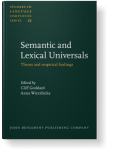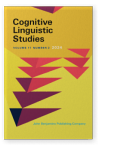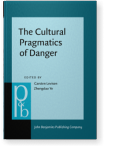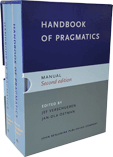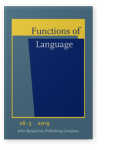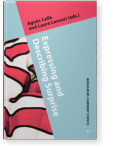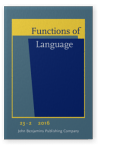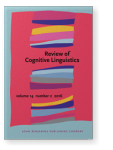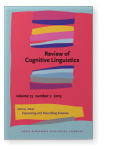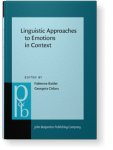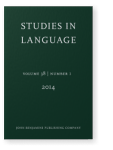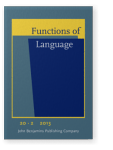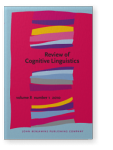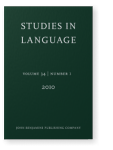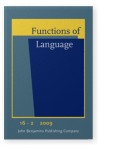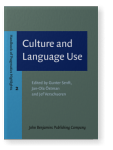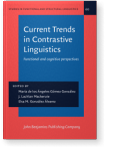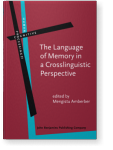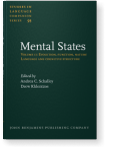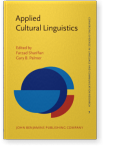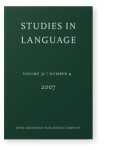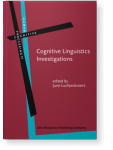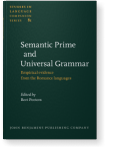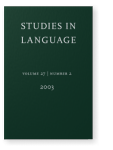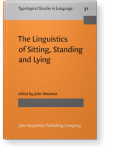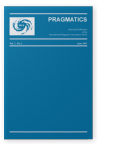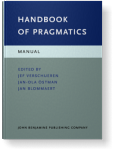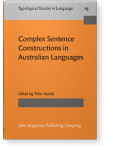Cliff Goddard
List of John Benjamins publications for which Cliff Goddard plays a role.
Book series
Journal
ISSN 0929-998X | E-ISSN 1569-9765
“Happiness” and “Pain” across Languages and Cultures
Edited by Cliff Goddard and Zhengdao Ye
[Benjamins Current Topics, 84] 2016. vi, 145 pp.
Subjects Anthropological Linguistics | Cognition and language | Semantics | Sociolinguistics and Dialectology
"Happiness" and "Pain" across Languages and Cultures
Edited by Cliff Goddard and Zhengdao Ye
Special issue of International Journal of Language and Culture 1:2 (2014) v, 141 pp.
Subjects Anthropological Linguistics | Applied linguistics | Cognition and language | Cognitive psychology | Communication Studies | Pragmatics
Cross-Linguistic Semantics
Edited by Cliff Goddard
[Studies in Language Companion Series, 102] 2008. xvi, 356 pp.
Subjects Semantics | Theoretical linguistics
Cognitive Exploration of Language and Linguistics: Second revised edition
Edited by René Dirven † and Marjolijn H. Verspoor
[Cognitive Linguistics in Practice, 1] 2004. xii, 277 pp.
Subjects Cognition and language
Meaning and Universal Grammar: Theory and empirical findings. 2 Volumes (set)
Edited by Cliff Goddard and Anna Wierzbicka
[Studies in Language Companion Series, 60-61] 2002. xvi, 337 pp. & xvi, 337 pp.
Subjects Semantics | Theoretical linguistics | Typology
Meaning and Universal Grammar: Theory and empirical findings. Volume 2
Edited by Cliff Goddard and Anna Wierzbicka
[Studies in Language Companion Series, 61] 2002. xvi, 334 pp.
Subjects Semantics | Theoretical linguistics | Typology
Meaning and Universal Grammar: Theory and empirical findings. Volume 1
Edited by Cliff Goddard and Anna Wierzbicka
[Studies in Language Companion Series, 60] 2002. xvi, 337 pp.
Subjects Semantics | Theoretical linguistics | Typology
Cognitive Exploration of Language and Linguistics
René Dirven † and Marjolijn H. Verspoor
[Cognitive Linguistics in Practice, 1 (1999)] 1999. xiv, 300 pp.
Subjects Cognition and language
Semantic and Lexical Universals: Theory and empirical findings
Edited by Cliff Goddard and Anna Wierzbicka
[Studies in Language Companion Series, 25] 1994. viii, 510 pp.
Subjects Functional linguistics | Semantics
2024 ‘Long’, ‘flat’, ‘round’, ‘hard’, ‘heavy’, ‘sharp’: Basic conceptual building blocks in the realm of the physical Cognitive Linguistic Studies 11:2, pp. 251–273 | Article
Cognitive linguists have not paid much attention to the conceptual semantics of basic adjectives used predicatively about physical objects, concentrating mainly on attributive constructions (e.g., adjective ordering, interactions between adjective and noun) or on figurative uses. Among the… read more
2024 Chapter 11. Security , Sicherheit , ānquán: Similar-but-different key concepts in English, German and Chinese The Cultural Pragmatics of Danger: Cross-linguistic perspectives, Levisen, Carsten and Zhengdao Ye (eds.), pp. 217–235 | Chapter
In this chapter we first develop a semantic-conceptual analysis of the English word security, a key word in international geopolitical discourse, contrasting it with English safety. We then investigate the meanings of comparable words in German and in Chinese, i.e. Sicherheit and ānquán,… read more
2023 Applied semantics and climate communication Australian Review of Applied Linguistics: Online-First Articles | Article
This paper explores ways in which applied semantics (coming out of Natural Semantic Metalanguage approach) can inform effective communicative strategies for action on climate change. After framing discussion, it presents three case studies, which are intentionally disparate in nature:… read more
2022 Componential analysis Handbook of Pragmatics: Manual, Verschueren, Jef and Jan-Ola Östman (eds.), pp. 229–237 | Chapter
2019 The semantics of evaluational adjectives: Perspectives from Natural Semantic Metalanguage and Appraisal Functions of Language 26:3, pp. 308–342 | Article
We apply the Natural Semantic Metalanguage (NSM) approach (Goddard & Wierzbicka 2014) to the lexical-semantic analysis of English evaluational adjectives and compare the results with the picture developed in the Appraisal Framework (Martin & White 2005). The analysis is corpus-assisted, with… read more
2017 The complex, language-specific semantics of “surprise” Expressing and Describing Surprise, Celle, Agnès and Laure Lansari (eds.), pp. 27–49 | Article
This study is conducted using the NSM (Natural Semantic Metalanguage) methodology, which seeks to explicate complex language-specific concepts into configurations of simple universal concepts (Goddard, 2011; Goddard &
Wierzbicka, 2014a; cf. Ye, 2013). The study has three main dimensions. It begins… read more
2016 Explicating the English lexicon of ‘doing and happening’ Functions of Language 23:2, pp. 214–256 | Article
This study proposes NSM semantic explications for a cross-section of the English verbal lexicon of ‘doing and happening’. The twenty-five verbs are drawn from about a dozen verb classes, including verbs for non-typical locomotion (crawl, swim, fly), other intransitive activities (play, sing),… read more
2016 Exploring “happiness” and “pain” across languages and cultures “Happiness” and “Pain” across Languages and Cultures, Goddard, Cliff and Zhengdao Ye (eds.), pp. 1–18 | Article
This chapter argues that the cross-linguistic study of subjective experience as expressed, described and construed in language cannot be set on a sound footing without the aid of a systematic and non-Anglocentric approach to lexical semantic analysis. This conclusion follows from two facts, one… read more
2016 “Walking” and “running” in English and German: The conceptual semantics of verbs of human locomotion Review of Cognitive Linguistics 14:2, pp. 303–336 | Article
This study examines the conceptual semantics of human locomotion verbs in two languages – English and German – using the Natural Semantic Metalanguage approach. Based on linguistic evidence, it proposes semantic explications for English walk and run, and their nearest counterparts in German, i.e.… read more
2015 The complex, language-specific semantics of “surprise” Expressing and Describing Surprise, Celle, Agnès and Laure Lansari (eds.), pp. 291–313 | Article
This study is conducted using the NSM (Natural Semantic Metalanguage) methodology, which seeks to explicate complex language-specific concepts into configurations of simple universal concepts (Goddard, 2011; Goddard & Wierzbicka, 2014a; cf. Ye, 2013). The study has three main dimensions. It begins… read more
2014 On “Disgust” Linguistic Approaches to Emotions in Context, Baider, Fabienne H. and Georgeta Cislaru (eds.), pp. 73–98 | Article
Using the Natural Semantic Metalanguage (NSM) approach, this study explores conceptualisations of "disgust" in English via semantic analysis of descriptive adjectives (disgusted and disgusting) and interjections (Ugh! and Yuck!). As well as drawing out some subtle meaning differences between… read more
2014 Semantic fieldwork and lexical universals Studies in Language 38:1, pp. 80–127 | Article
The main goal of paper is to show how NSM findings about lexical universals (semantic primes) can be applied to semantic analysis in little-described languages. It is argued that using lexical universals as a vocabulary for semantic analysis allows one to formulate meaning descriptions that are… read more
2014 Exploring “happiness” and “pain” across languages and cultures "Happiness" and "Pain" across Languages and Cultures, Goddard, Cliff and Zhengdao Ye (eds.), pp. 131–148 | Article
This paper argues that the cross-linguistic study of subjective experience as expressed, described and construed in language cannot be set on a sound footing without the aid of a systematic and non-Anglocentric approach to lexical semantic analysis. This conclusion follows from two facts, one… read more
2013 ‘Degrad verbs’ in Spanish and English: Collocations, lexical functions and contrastive NSM semantic analysis Functions of Language 20:2, pp. 219–249 | Article
The Lexical Function Degrad is a device used in Meaning-Text Theory (MTT) to select the appropriate verb for expressing ‘to become permanently worse or bad’ in combination with different nouns. For example, in English one says that fruit rots, milk goes off, shoes wear out, flowers wilt, and iron… read more
2010 Semantic molecules and semantic complexity: (with special reference to “environmental” molecules) Review of Cognitive Linguistics 8:1, pp. 123–155 | Article
In the NSM approach to semantic analysis, semantic molecules are a well-defined set of non-primitive lexical meanings in a given language that function as intermediate-level units in the structure of complex meanings in that language. After reviewing existing work on the molecules concept… read more
2010 ‘Want’ is a lexical and conceptual universal: Reply to Khanina Studies in Language 34:1, pp. 108–123 | Article
The question of whether or not all languages have a word for ‘want’ (as in ‘I know what you want, I want the same’) is far more important than many linguists appear to realize. Having studied and debated this question for many years, we welcome Olesya Khanina’s (2008) paper “How universal is… read more
2009 The conceptual semantics of numbers and counting: An NSM analysis Functions of Language 16:2, pp. 193–224 | Article
This study explores the conceptual semantics of numbers and counting, using the natural semantic metalanguage (NSM) technique of semantic analysis (Wierzbicka 1996; Goddard & Wierzbicka (eds.) 2002). It first argues that the concept of a number in one of its senses (number1, roughly, “number… read more
2009 Componential analysis Culture and Language Use, Senft, Gunter, Jan-Ola Östman and Jef Verschueren (eds.), pp. 58–67 | Article
2009 Cultural scripts Culture and Language Use, Senft, Gunter, Jan-Ola Östman and Jef Verschueren (eds.), pp. 68–80 | Article
2008 3. Towards a systematic table of semantic elements Cross-Linguistic Semantics, Goddard, Cliff (ed.), pp. 59–81 | Article
2008 1. Natural Semantic Metalanguage: The state of the art Cross-Linguistic Semantics, Goddard, Cliff (ed.), pp. 1–34 | Article
2008 Universal human concepts as a basis for contrastive linguistic semantics Current Trends in Contrastive Linguistics: Functional and cognitive perspectives, Gómez González, María de los Ángeles, J. Lachlan Mackenzie and Elsa M. González Álvarez (eds.), pp. 205–226 | Article
This study sets out to demonstrate that the NSM metalanguage of semantic primes provides a stable language-neutral medium for fine-grained contrastive semantic analysis, in both the lexical and grammatical domains. The lexical examples are drawn from “yearning-missing” words in English, Polish,… read more
2008 2. New semantic primes and new syntactic frames: "Specificational BE" and "abstract THIS/IT" Cross-Linguistic Semantics, Goddard, Cliff (ed.), pp. 35–57 | Article
2008 8. Re-thinking THINK in contrastive perspective: Swedish vs. English Cross-Linguistic Semantics, Goddard, Cliff (ed.), pp. 225–240 | Article
2007 6. A "lexicographic portrait" of forgetting The Language of Memory in a Crosslinguistic Perspective, Amberber, Mengistu (ed.), pp. 119–137 | Article
This study aims to provide a detailed analysis of the English verb ‘forget’. It examines its three main clausal complement types (to-complement, e.g. I forgot to lock the door, that-complement, e.g. I forgot that the door was locked, andwh-complement, e.g. I forgot where I put the key),… read more
2007 2. A culture-neutral metalanguage for mental state concepts Mental States: Volume 2: Language and cognitive structure, Schalley, Andrea C. and Drew Khlentzos (eds.), pp. 11–35 | Article
2007 7. Semantic primes and cultural scripts in language learning and intercultural communication Applied Cultural Linguistics: Implications for second language learning and intercultural communication, Sharifian, Farzad † and Gary B. Palmer (eds.), pp. 105–124 | Chapter
Because meaning is fundamental to language and culture, a practical technique for describing meanings and transposing them across languages has multiple practical applications. This chapter demonstrates several applications of the NSM approach to semantics: as a guide to core vocabulary in the… read more
2007 NSM analyses of the semantics of physical qualities: sweet, hot, hard, heavy, rough, sharp in cross‑linguistic perspective Studies in Language 31:4, pp. 765–800 | Article
All languages have words, such as English hot and cold, hard and soft, rough and smooth, and heavy and light, which attribute qualities to things. This paper maps out how such descriptors can be analysed in the natural semantic metalanguage (NSM) framework, in terms of like and other semantic… read more
2006 9. Verbal explication and the place of NSM semantics in cognitive linguistics Cognitive Linguistics Investigations: Across languages, fields and philosophical boundaries, Luchjenbroers, June (ed.), pp. 189–218 | Chapter
2006 Cultural Scripts Handbook of Pragmatics: 2006 Installment, Verschueren, Jef and Jan-Ola Östman (eds.), pp. 1–16 | Article
2005 Componential analysis Handbook of Pragmatics: 2003–2005 Installment, Östman, Jan-Ola and Jef Verschueren (eds.), pp. 1–12 | Article
2003 Dynamic ter - in Malay (Bahasa Melayu): A study in grammatical polysemy Studies in Language 27:2, pp. 287–322 | Article
This paper undertakes a fine-grained semantic analysis of some of the multiple uses of the polyfunctional verbal prefix ter- in Malay (Bahasa Melayu), the national language of Malaysia. The analysis is conducted within the natural semantic metalanguage (NSM) framework originated by Anna… read more
2002 5. The On-going Development of the NSM Research Program Meaning and Universal Grammar: Theory and empirical findings, Goddard, Cliff and Anna Wierzbicka (eds.), pp. 301–321 | Article
2002 1. The Search for the Shared Semantic Core of All Languages Meaning and Universal Grammar: Theory and empirical findings, Goddard, Cliff and Anna Wierzbicka (eds.), pp. 5–40 | Article
2002 3. Semantic Primes and Universal Grammar in Malay (Bahasa Melayu) Meaning and Universal Grammar: Theory and empirical findings, Goddard, Cliff and Anna Wierzbicka (eds.), pp. 87–172 | Article
2002 Opening Statement Meaning and Universal Grammar: Theory and empirical findings, Goddard, Cliff and Anna Wierzbicka (eds.), pp. 1–3 | Miscellaneous
2002 Preface to Volume II Meaning and Universal Grammar: Theory and empirical findings, Goddard, Cliff and Anna Wierzbicka (eds.), pp. xv–xvi | Miscellaneous
2002 2. Semantic Primes and Universal Grammar Meaning and Universal Grammar: Theory and empirical findings, Goddard, Cliff and Anna Wierzbicka (eds.), pp. 41–85 | Article
2002 9. Posture, location, existence, and states of being in two Central Australian languages The Linguistics of Sitting, Standing and Lying, Newman, John (ed.), pp. 213–238 | Chapter
1997 The semantics of coming and going Pragmatics 7:2, pp. 147–162 | Article
1995 Componential analysis Handbook of Pragmatics: Manual, Verschueren, Jef, Jan-Ola Östman and Jan Blommaert † (eds.), pp. 147–153 | Article
1994 9 Lexical Primitives in Yankunytjatjara Semantic and Lexical Universals: Theory and empirical findings, Goddard, Cliff and Anna Wierzbicka (eds.), pp. 229–262 | Chapter
1994 1 Semantic Theory and Semantic Universals Semantic and Lexical Universals: Theory and empirical findings, Goddard, Cliff and Anna Wierzbicka (eds.), pp. 7–30 | Chapter
1994 2 Introducing Lexical Primitives Semantic and Lexical Universals: Theory and empirical findings, Goddard, Cliff and Anna Wierzbicka (eds.), pp. 31–56 | Chapter
1988 Verb Serialisation and the Circumstantial Construction in Yankunytjatjara Complex Sentence Constructions in Australian Languages, Austin, Peter (ed.), pp. 177–192 | Article
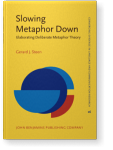
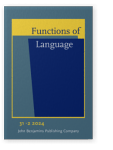
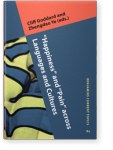
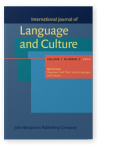
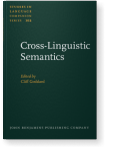
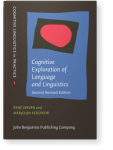

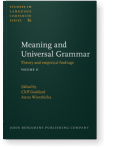
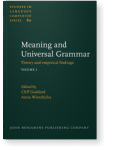
.hb.png)
